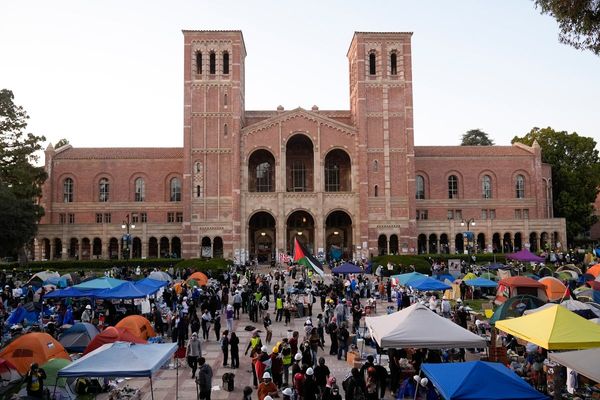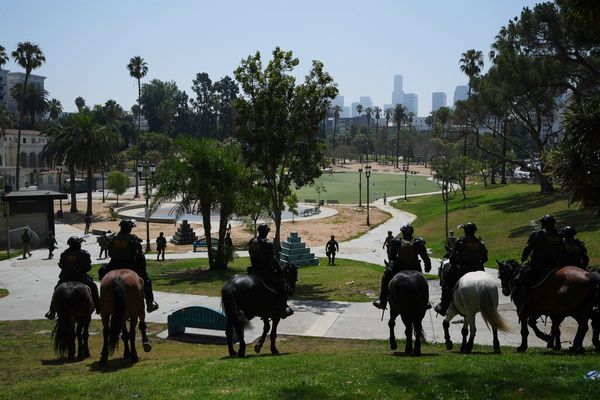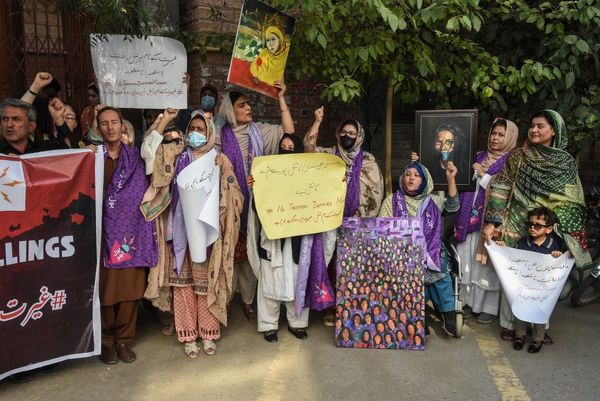
A member of Israel’s war cabinet has said the country will launch its threatened ground offensive against Rafah, the last place of relative safety in Gaza, if Hamas does not release its remaining Israeli hostages by the beginning of the holy Muslim month of Ramadan in just under three weeks.
“The world must know, and Hamas leaders must know – if by Ramadan our hostages are not home, the fighting will continue everywhere, including the Rafah area,” Benny Gantz, a retired Israel Defense Forces (IDF) chief of staff, told a conference of American Jewish leaders in Jerusalem on Sunday.
As Israeli forces have expanded ground operations steadily southwards in their war against Hamas over the past four months, Rafah – situated on the border with Egypt, and before the conflict home to about 280,000 people – has become the last refuge for more than half of the strip’s population of 2.3 million.
Widespread destruction and continuing fighting across the territory, two-thirds of which is already under Israeli evacuation orders, means it is unclear how civilians are expected to flee the long-awaited offensive.
In Gaza on Monday, the IDF claimed victory in the weeks-long fight for the central town of Khan Younis and nearby refugee camps, making the prospect of a Rafah ground attack more likely. Seven patients died at Khan Younis’s Nasser hospital after power cuts caused by a days-long Israeli raid on the premises, and another 20 were in urgent need of referral, the World Health Organization said.
Airstrikes and ground fighting over the past day killed more than 100 people, mostly women and children, pushing the death toll over 29,000, said the Hamas-run territory’s health ministry. About 85% of the population have been displaced from their homes, and one in four are starving, according to the UN.
The war, now in its fifth month, was triggered by Hamas’s attack on Israel on 7 October last year, in which 1,200 people were killed and 250 taken hostage. Of the remaining 130 hostages still in Gaza, about 30 are presumed dead, according to Israeli officials.
Gantz’s threat that Israel will not slow or stop its operation in Gaza comes amid stalling negotiations aimed at a ceasefire and prisoner and hostage exchanges. A major offensive in Rafah, which world leaders fear could lead to a humanitarian catastrophe, during Ramadan could also serve as a trigger for further violence across Israel, the occupied Palestinian territories and the wider region. Iran-backed militias in Iraq, Syria and Lebanon have already been drawn into the conflict.
The fasting period is often tense in Jerusalem. Clashes in Ramadan over access to the divided city’s Temple Mount, or al-Haram al-Sherif, the holiest site in Judaism and the third holiest in Islam, have helped to ignite wars in the past.
Arab religious and political leaders on Monday reacted with anger to news that Israel’s prime minister, Benjamin Netanyahu, had accepted the recommendations of his far-right national security minister, Itamar Ben-Gvir, to limit access to the holy site for Palestinians during Ramadan. Unusually, this year’s restrictions will also extend to Israel’s Muslim minority, which makes up about 18% of the population.
“Netanyahu’s decision [is a] gross blow to the freedom of religion. The man is held prisoner by the convicted terrorist Ben-Gvir over the October 7 collapse,” said Ahmad Tibi, the leader of the Knesset’s leftwing Arab Taal party.
“This is a government of pyromaniacs. The time has come for President Biden to impose sanctions on Ben-Gvir,” he added, referring to sanctions placed by the US, UK and France on dozens of hardline Israeli settlers living in occupied East Jerusalem and the West Bank.
Ramadan, a month of fasting culminating in Eid al-Fitr, is expected to begin on 10 March. Security restrictions at Temple Mount were not final and would be decided “in accordance with situation assessments”, Gantz said.
Netanyahu’s office said in a statement: “The prime minister has made a balanced decision that allows for religious freedom within the limits of the security needs as established by heads of the security establishment. Any reports to the contrary are false.”
Netanyahu, who fears becoming more vulnerable in his three corruption trials if he is ousted from office when the war ends, is widely believed in Israel to be kowtowing to the demands of his far-right coalition partners, who have repeatedly threatened to collapse his government over concessions to either Hamas or Palestinians in general.
The prime minister has also been accused of slow-walking ceasefire talks. Netanyahu said on Saturday that while he had sent a delegation to ceasefire talks in Cairo last week at Joe Biden’s request, he did not see what would be gained by sending them again.
The families and friends of those held captive in Gaza have kept up an active campaign for their release. However, polling published on Monday by the Israeli thinktank the Jewish People Policy Institute found that 40% of respondents, if they had to choose, would prefer the removal of Hamas from Gaza over returning the hostages.
While the US, Israel’s most important ally, has provided crucial military support and diplomatic cover for the Israeli war effort, relations between Biden and Netanyahu have reached a nadir over the colossal, and growing, death toll in Gaza.
Also on Monday, the international court of justice (ICJ), the UN’s top court, began hearing oral arguments after a landmark 2022 UN general assembly resolution requested an advisory opinion on the “legal consequences arising from the policies and practices of Israel in the occupied Palestinian territory” – a move seen as important because while various UN bodies have found that aspects of the occupation are illegal, there has never been a judgment on whether the occupation itself, now in its 57th year, either is or has become unlawful.
The ICJ is due to hold hearings all week on the legal implications of the occupation, with an unprecedented 52 countries, including the US and Russia, expected to give evidence. Israel will not participate in the hearings but submitted a written contribution dated 24 July 2023, in which it urged the court to dismiss the request for an opinion.
Israel is facing two other major international legal cases over its treatment of Palestinians.
South Africa also filed a case against Israel before the court in December, alleging that Israel’s offensive in Gaza amounted to genocide. An interim judgment from the court last month said Israel must “take all measures within its power” to prevent such acts.
The international criminal court decided in 2021 that it had a mandate to investigate violence and war crimes committed by Israeli and Palestinian factions, although Israel is not a member of the court and does not recognise its authority.
• This article was amended on 19 February 2024. An earlier version referred to Benny Gantz as Israel’s defence minister. He is a former defence minister (2020-2022), as well as a former IDF chief of staff, and a current member of the war cabinet.
On Wednesday 20 March, 7-8.15pm GMT, join Devika Bhat, Peter Beaumont and Ghaith Abdul-Ahad as they discuss the fast developing crisis in the Middle East.
Book tickets here or at theguardian.live







